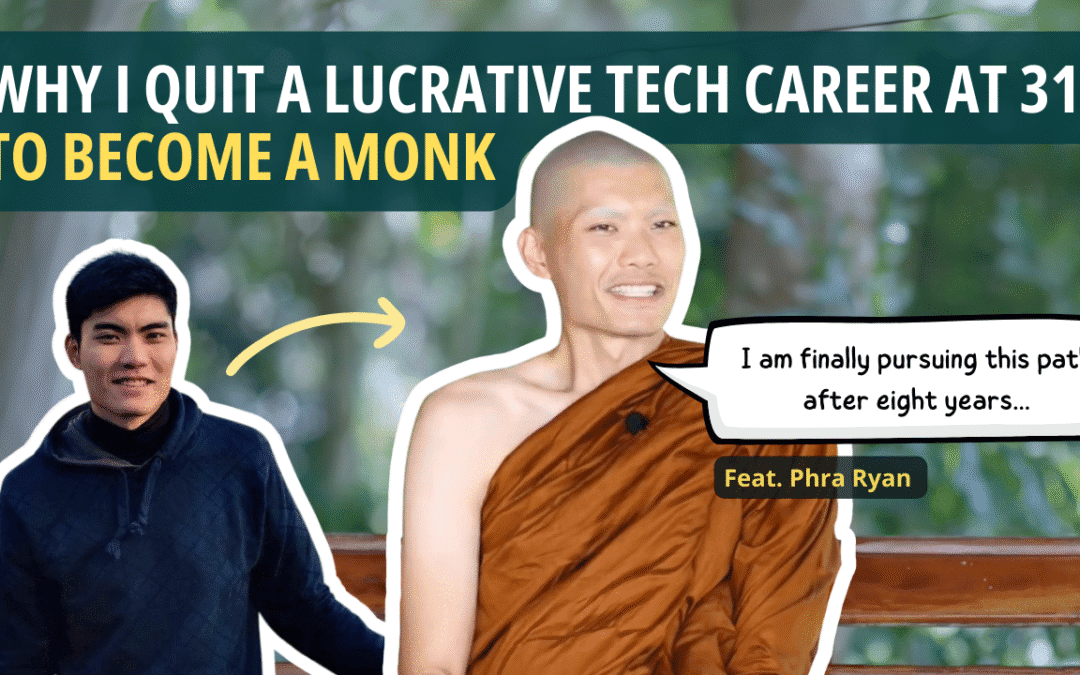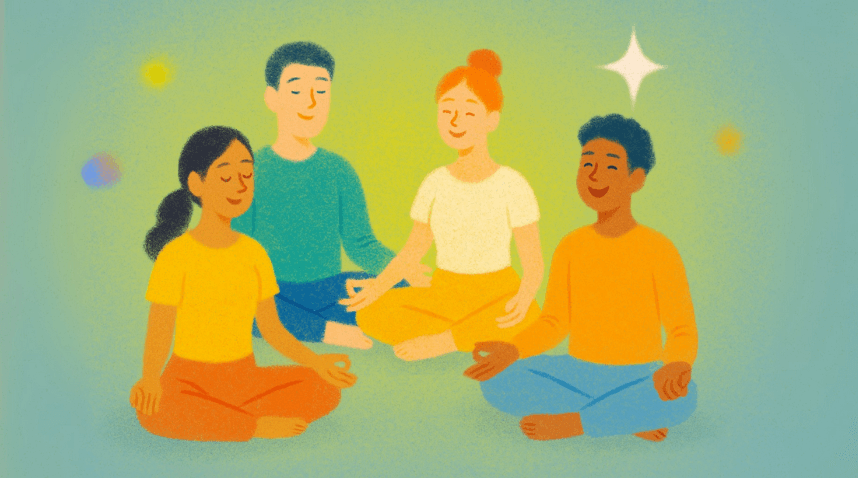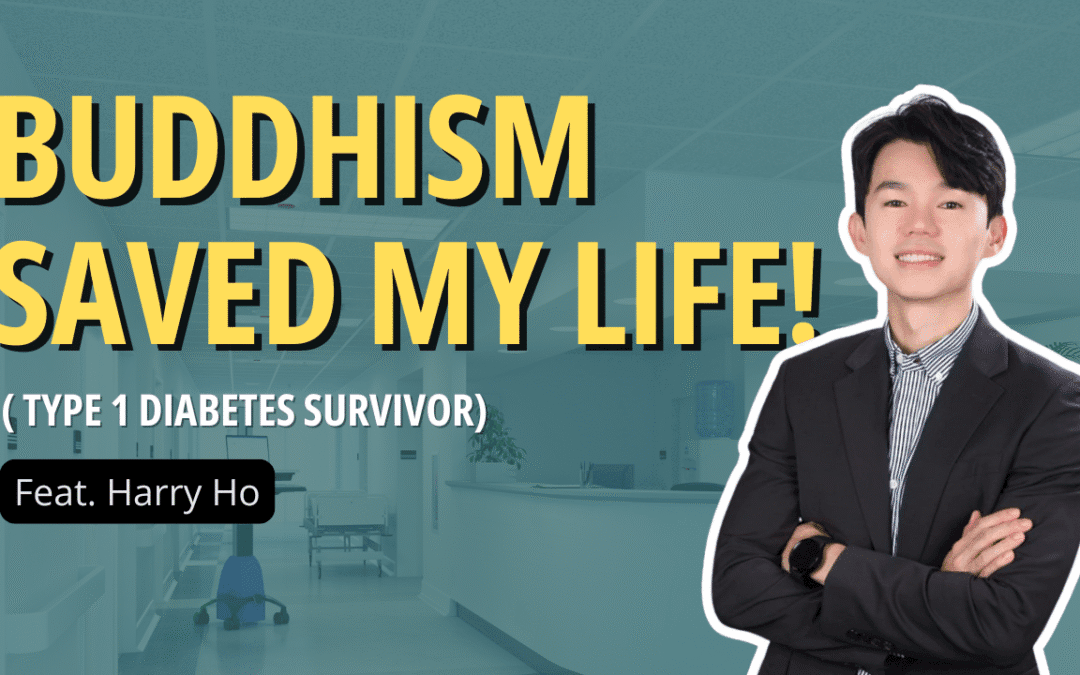
Why a 31-Years-Old Singaporean Techie Chose the Monk Life ft. Phra Ryan
Summary
In this intimate and reflective conversation, Phra Ryan shares his transformative journey from the bustling tech world of Singapore to the serene life of a novice Buddhist monk in Thailand. He recounts his early exposure to Buddhism, his time at Wat Pah Nanachat, and his eventual ordination at Wat Marp Jan under Luang Por Anan. Through moments of honesty and vulnerability, Phra Ryan explores what drew him toward monastic life — the search for peace, meaning, and freedom from material attachment. He opens up about family challenges, self-doubt, and the profound teachings that anchor his path, offering listeners a deeply human perspective on spirituality, purpose, and inner peace.
About the Speaker
Halfway through university, Ryan embarked on a spiritual journey into the deeper meaning of life, and found himself drawn towards Buddhism during a silent retreat in the Australian bush, which marked the beginning of an eight-year long journey into monk-hood. This is his story.
Key Takeaways
The Journey From Material Success to Spiritual Fulfillment
Phra Ryan’s story illustrates the inner dissatisfaction that can exist even amid external comfort. Despite a stable career in IT and the privileges of modern life, he felt a void that wealth and achievement couldn’t fill. His turn toward ordination represents a universal search for meaning beyond material success — a reminder that peace often lies in letting go rather than gaining more.
Letting Go of Attachment Is the Core of Peace
Through his teacher Luang Por’s insights, Phra Ryan explains that our ordinary, unmindful state is already a form of “craziness” — clinging to the body, feelings, and thoughts that create suffering. True practice is about freeing the mind from these attachments. This realization bridges ancient Buddhist wisdom with modern psychological insight, offering a pathway for anyone — monk or layperson — to find greater calm and clarity.
Faith, Discipline, and Humility on the Path
Even after ordaining, Phra Ryan admits to feelings of “imposter syndrome” — acknowledging the gap between the monk’s robe he wears and the inner transformation he’s still cultivating. His humility and devotion to continuous practice reveal that the spiritual journey isn’t about perfection, but about sincere effort and faith in the process.
Transcript
Full Transcript
[00:00:00] Normally, when we are not mindful in our daily life, we are already quite crazy. Truth be told, a lot of monks do disrobe, but we’ll see how it goes. Actually feeling a bit nervous wearing these robes because at this moment, I’m not yet a monk. Although I look like a monk, but actually I’m still a novice monk, or we call it Samanera. So I haven’t actually been here that long. I’ve only been here since Monday. And today’s Sunday, so that makes a week.
[00:00:44] I actually feel quite relieved in a way. Because the whole week has been anticipating this moment. In a way, I’ve been anticipating it for quite a few years already. I had this wish in my heart that I would ordain. And now that I finally ordained at least halfway, I am actually very relieved and quite comfortable in a way. I’m not so stressed because of my desire to ordain as I was in the past. Because when I was in Singapore, I couldn’t really pursue this path.
[00:01:17] But now that I am trying it out for real. I can really see that, this is something that I would want to do at least for the foreseeable future.
[00:01:30] Yeah. So my journey actually began eight years ago. I met Ajahn Dhammasiha, who is the abbot of Dhammagiri Forest Hermitage in Australia. He actually visited Singapore back in 2014. But somehow, halfway through uni, I met a Burmese man who then told me that he used to be a monk. I was quite intrigued by that fact.
[00:01:57] And I thought, “Oh, wow! Maybe I could try out doing some kind of a silent retreat.” Because at that time I wasn’t Buddhist, I wasn’t spiritual in any sense. But I thought that it would be nice to have this quiet time in the forest. It sounded quite idyllic at the time because Singapore is a city with so many buildings and concrete.
[00:02:17] So I wanted to get out of the city and into the forest. I went to Australia and I met Ajahn Dhammasiha. And I stayed there for 23 days. Within that 23 days, I read so many books. I learned about Luang Pu Chah. I somehow garner a lot of faith in the Buddha and I eventually took up the triple refuge. In fact, even within those 23 days, I already started to feel like, “oh, okay. I might consider ordination at some point in the future.”
[00:02:47] So this is me trying to pursue that path eight years later.
[00:02:59] I was previously an Anagarika (white robes) in Wat Pah Nanachat. This was in 2018, so six years ago. I managed to stay there for six months. Part of it I was Anagarika, or they call it “Pa Kao”, which meant that I wore something similar but in white. That was a trial period for me to see if ordination could be something that’s suitable. Because before that, I’ve never really been in a Buddhist setting very much, having just taken up Buddhism two years before that.
[00:03:32] During my time at Wat Pah Nanachat, the main thing I took away from that was that I wasn’t entirely incompatible with this path. After that, my parents actually came. My mom brought my grandparents to bring me home. I was okay with that because I did plan for only six months at the time.
[00:03:49] So I went back to Singapore and I worked for five years in the IT industry. And all throughout that time, I had this idea of going back to ordain at some point. Also, my mother and I had some residential issues, so that was the main thing I needed to address. I would say most of my preparation really involved that residential issue to the point that my mom has pretty much settled in just a month ago so that I can finally come to ordain based on my agreement with my mother.
[00:04:26] As a novice monk, I only take 10 precepts. So that makes my life relatively easier. During this period of being a novice monk, I’m supposed to train myself up and understand the ways of a monk so that eventually (I can) fully ordain as a monk. And take up the entire set of rules all together.
[00:04:49] Six years ago, pursuing the path of ordination, I really hoped that I could stay in the robes as long as I can. Ideally all my life. But who knows? Truth be told, a lot of monks do disrobe, but we’ll see how it goes.
[00:05:07] On one hand, I grew up in a very privileged setting in Singapore. I think quite a lot of people can probably relate. We are quite materially well off in Singapore. We don’t really have much lack in any way. So that’s the way that I grew up. And yet as I was growing up during my early twenties, I felt that I wasn’t a very satisfied person. I was in relationships. I also had quite a number of friends and we went to party and do all the things that young kids do. And yet I didn’t really feel like I was a very happy person. At the same time, those were the years that I was considering what would be my path in the future? What do I really want to be in the future?
[00:05:52] So I did this search. I went to read up books about famous people. I went to read Lee Kuan Yew’s book, “The Singapore Story”. I went to read the biography of Elon Musk, thinking that, these are such great people that are very much admired in society and people want to be like them.
[00:06:08] I asked myself, “Would I like to be like them in the future?”
[00:06:10] I actually did pursue that to a little bit. I actually joined the political association in university. I studied computer science thinking that I might do tech, and I did join the IT industry. However, along the way I found that the people that really inspired me most were the Buddha and the monks.
[00:06:32] I gained this aspiration that if I could just be a little bit more like them, then that would be good enough for me. Like if I could just be half of some of the great teachers that I have in my heart today, I would die a very satisfied person.
[00:06:53] So it depends which family and which friend. I think obviously the closest family members would be my parents. It took my mom a long time to come around to give me permission. I wouldn’t say that she’s entirely supportive of what I’m doing given that she has another faith in a different religion.
[00:07:16] However, to me, I felt that we had to come to some kind of middle ground. I mentioned earlier there was this residential issue that I’ve been spending the past few years settling. So the agreement was that I would help her with all of my ability to settle that residential issue. And kind of in return, she would actually give me permission to ordain. And that was for my mom.
[00:07:43] For my dad, he has always been quite liberal. He grew up in quite the same way, wanting to have a lot of freedom. So even when I left for Wat Pah Nanachat in 2018, he was actually okay with it. Even now, although again he’s not entirely supportive— he would probably prefer that I do something else— but he’s still willing to let me do what I want. Simply because that’s what he was given the freedom to do in his own youth. As for my friends, definitely the Buddhist friends, they’re very supportive and I’m very grateful for that.
[00:08:18] However, most of my other friends not in the Buddhist community, they probably have some difficulty understanding what I’m doing. I managed to explain a little bit to some of them, though I have no idea how much they would really sympathize with what I’m saying. But in some way, I do hope that what I’m doing would benefit them a little bit. In terms of, maybe inspiring them to think about values that may not be entirely materialistic in nature.
[00:08:54] During my first few days here, Luang Por actually mentioned that to one of the lay residents or retreatants who came from America. The question to Luang Por was, “What is the purpose of this practice?”
[00:09:11] The person asking the question also mentioned that, “How do I practice so that I don’t go crazy?”
[00:09:15] So Luang Por gave a very interesting answer. Luang Por actually mentioned that normally when we are not mindful in our daily life, we are already quite crazy. We are crazy because we so quickly attach to all these five aggregates, we call it. The body, the perception, to feeling, to mental formations, to consciousness. So that’s the natural state of how we live in a day-to-day life.
[00:09:43] We don’t see how it causes us to suffer normally. So the Buddhist path is really one of letting go of our attachments to these things. And that was what Luang Por said as well. That’s what really the goal of this practice is really to cultivate a mind that is free from attachment. So that we can learn to be more peaceful people and people who just suffer less in general.
[00:10:10] So I think for any average person who doesn’t know much about Buddhism, they don’t necessarily have to take up the ordination path, like me, as a whole. But even just the basic principles of cultivating some virtue, right? Cultivating some sense of collectedness in daily life and trying to incorporate some concepts of wisdom in their life.
[00:10:36] This would already make them more peaceful and more contented in their daily lives. That’s really to me why most people should consider taking up the Noble Eightfold Path.
[00:10:52] I think I’m feeling a mixture of emotions. So I mentioned earlier, I feel a sense of relief that I finally managed to take the next step in this path beyond what I’ve been doing for the past six years in Singapore. At the same time, I am actually feeling a bit nervous wearing these robes because one way that you can call the yellow robe of a monk is that it is the banner of the Arahant.
[00:11:22] The meaning of Arahant is a person who has overcome all of his defilements. That being the case, as for me, I’m not a person who has overcome all of my defilements. I feel like I have this sense of imposter syndrome. I think that’s something I might need to overcome in my own practice as well, to try and cultivate those values within myself. Because, right now I might look like a monk on the outside, but the whole idea during my time here is really to bring the monk within and to cultivate the values that monks should try and uphold, namely the Noble Eightfold Path that we’ve mentioned.
[00:12:09] I did mention that previously I was at Wat Pah Nanachat. After that, I went back to Singapore and that question opened up again of “If I would take up this path for a second time, where would I go?” Obviously Nanachat would have been the obvious choice in a way because I was already there. But at the same time, in the six years since, every Friday evening, I’ve been joining the Zoom sessions that Luang Por Anan has kindly hosted for the global community along the way.
[00:12:44] I really felt to be part of this family of Wat Marp Jan and because it’s still part of the Luang Pu Chah tradition. I didn’t see that it was deviating in any way. In fact, I felt it was quite compatible in a sense that I gained some preliminary training at Wat Pah Nanachat. And then here I am at Wat Marp Jan under Luang Por Anan, who I have come to develop a lot of faith in.
[00:13:10] I do see that he’s a very accomplished practitioner and I do hope to become a bit more like him in every way. So definitely I want to be as close as I can to Luang Por Anan. Therefore I chose Wat Marp Jan.
[00:13:32] Before I learned about Buddhism, I led quite the normal life. I was just going through school. I was in university. I would never have imagined being… taking up this path of ordination. I was very much looking forward to going out in the work life and I wanted to, you know, contribute to society in a working way.
[00:13:57] I had a friend who actually told me, “I don’t want to work. I just want to have my financial freedom and not work. And just have my own free time.”
[00:14:05] And I was wondering, “oh, why? But when you work, you get to contribute to society.”
[00:14:10] And so, truth be told, here I am. As a monk, I don’t necessarily work in the conventional sense in that I am contributing economically. However, I hope to contribute to society in a more spiritual way. In a way that I feel would eventually bring people more peace. So what I would actually say then to when I was still in school at the time to me is that,
[00:14:38] “Well, now that you’ve taken up this path, you’ve given up most of everything else you’ve tried to pursue in life. So I wish you the best and I hope that you find what you’re looking for.”
[00:14:55] Yeah, that past me wouldn’t have understood what I’m doing right now, probably.
Special thanks to our sponsors:
Buddhist Youth Network, Lim Soon Kiat, Alvin Chan, Tan Key Seng, Soh Hwee Hoon, Geraldine Tay, Venerable You Guang, Wilson Ng, Diga, Joyce, Tan Jia Yee, Joanne, Suñña, Shuo Mei, Arif, Bernice, Wee Teck, Andrew Yam, Kan Rong Hui, Wei Li Quek, Shirley Shen, Ezra, Joanne Chan, Hsien Li Siaw, Gillian Ang, Wang Shiow Mei, Ong Chye Chye, Melvin, Yoke Kuen, Nai Kai Lee, Amelia Toh, Hannah Law, Shin Hui Chong, Dennis Lee
🙏 Sponsor us: https://handfulofleaves.life/support/
Editors and Transcribers of this episode:
Eng Yean Khai, Tan Si Jing, Bernice Bay, Cheryl Cheah
Visual and Sound Effects
Anton Thorne, Tan Pei Shan, Ang You Shan











